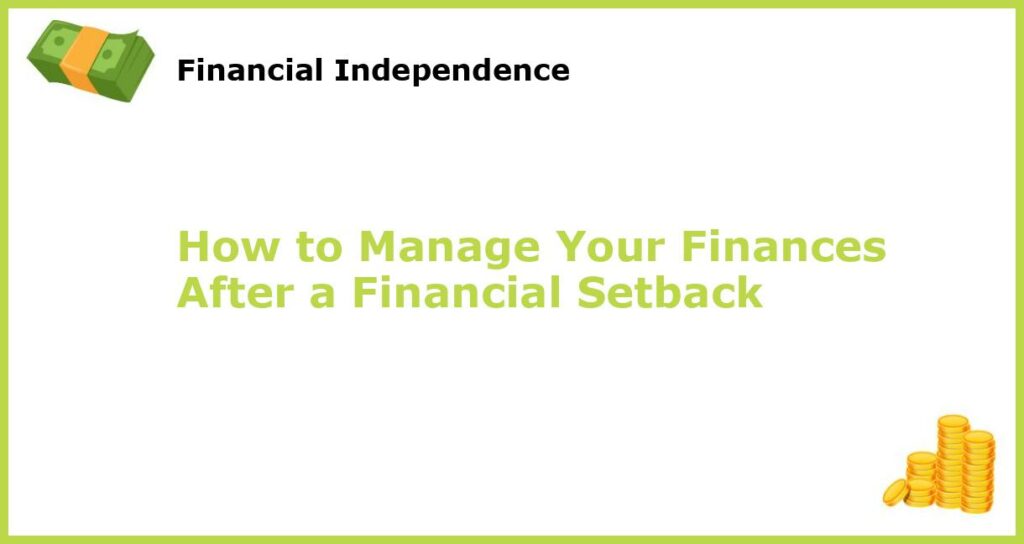Financial setbacks happen to everyone, and they can be difficult to deal with. Whether it was caused by a medical emergency, a job loss, or poor spending habits, it’s important to take control of the situation and start managing your finances as soon as possible. Here are some practical steps you can take to get back on track:
Assess the Damage

The first step is to assess the damage. This may involve taking a look at your bank account and credit card statements to determine how much was lost or where you overspent. It’s important to have a clear understanding of the severity of the setback before taking any further action. Once you have a clear picture of the financial damage, the next step will be to create a realistic budget.
Create a Budget

Creating a budget is absolutely critical in managing your finances after a setback. You’ll want to determine your monthly income and expenses to get a clear understanding of your financial position. Be sure to prioritize your expenses, focusing on essentials like housing, food, and transportation so that you can cover them first. You’ll need to make sacrifices, like reducing your entertainment expenses and eating out less, to stay on a sound financial footing.
Reduce Your Expenses

Reducing your expenses is an important part of managing your finances after a financial setback. Take a look at your monthly expenses and try to identify areas where you can cut back. Rethink your monthly subscription services, your transportation costs, and do an audit on your groceries. Consider switching to a cheaper cell phone plan, canceling subscriptions you don’t use, or cutting back on eating out to reduce expenses. Consider creating a list of important non-essential expenses and assigning a cap to each.
Find Additional Sources of Income

If reducing your expenses alone isn’t enough to cover your bills, consider finding additional sources of income. These could include a part-time job, freelancing, or selling items you no longer need. Look for high-demand jobs that pay more to help cover your bills. Be creative and think outside the box to find ways to increase your income.
Build an Emergency Fund

Having an emergency fund is essential to help deal with any unexpected expenses that may arise. An essential lesson to learn from a financial setback is the value of having an emergency fund. Ideally, you should aim to have three to six months’ worth of expenses saved in case of an unexpected expense, job loss, or other setback. Even if it takes a while, start building your emergency fund as soon as possible. Set your savings priority for between 5% and 10% of your monthly income.
Pay Off Debt

Managing your finances after a financial setback should also involve prioritizing debt repayment. Focus on paying off high-interest debt as soon as possible to avoid accruing more interest. Consider using the snowball method, where you focus on paying off your smallest debts first, to build momentum in taking back control of your finances.
Invest in Your Future

Although managing a financial setback can feel overwhelming, it’s important to remember the long term. Consider the situation as a transformational phase to it make good, instead of being trapped in it. You can invest in your future through saving for retirement, investing in stocks or a business, or furthering your education can help you build financial security and avoid future setbacks. You should aim for a feasible saving plan to build your investment.
Stay Positive and Focused

Managing a financial setback can be discouraging, but it’s important to stay positive and focused as you learn from it. Do not let the setback get you down, so celebrate small victories and keep your eye on the big picture. Remember that setbacks are a part of life, and with diligence and focus, you can rebound from this and come out even stronger. Remember a positive outlook can be a decisive factor in one’s journey back to financial stability.
Get Professional Help

If you’re struggling to manage your finances after a setback, don’t be afraid to seek professional help. A financial advisor or credit counselor can provide guidance and support to help you get back on track. They can assess your financial plan, help you strategize and make decisions. There’s no shame in asking for help when you need it, and actually, it is a responsible and financially mature thing to do.
Learn From Your Mistakes
Finally, it’s important to learn from your mistakes, so that you do not end up in this kind of setback again. Take the time to reflect on what led to the financial setback and identify areas where you can improve. This will help to avoid future setbacks that may be even more difficult to resolve. Use this experience as an opportunity to take control of your finances and make positive changes for the future.







